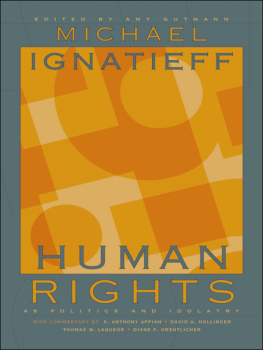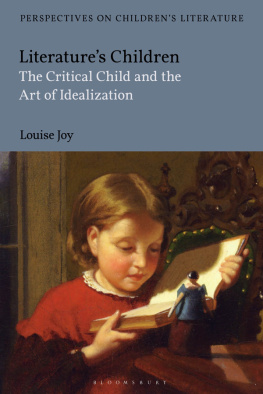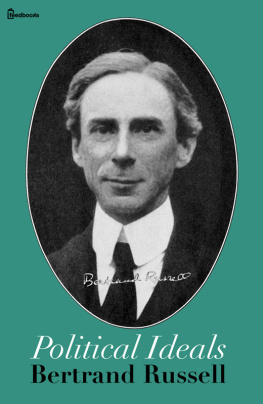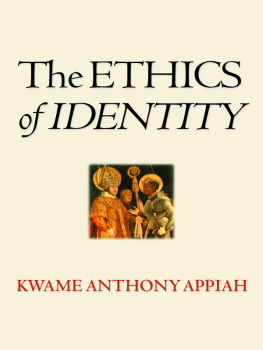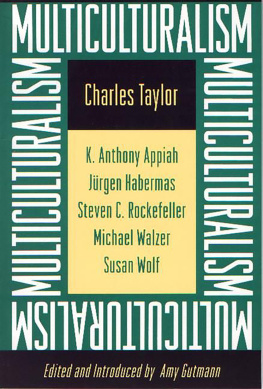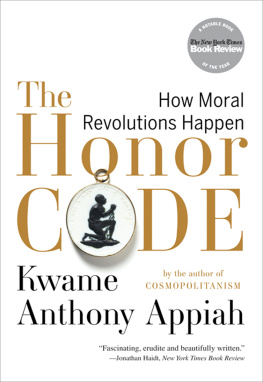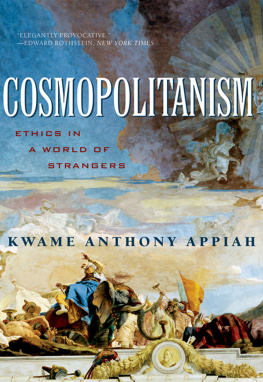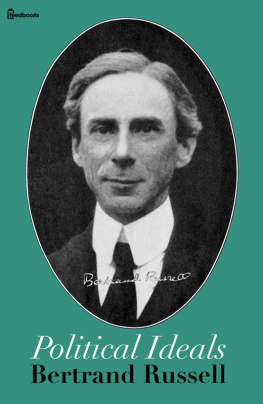Appiah - As If: Idealization and Ideals
Here you can read online Appiah - As If: Idealization and Ideals full text of the book (entire story) in english for free. Download pdf and epub, get meaning, cover and reviews about this ebook. publisher: Harvard Univ Pr, genre: Romance novel. Description of the work, (preface) as well as reviews are available. Best literature library LitArk.com created for fans of good reading and offers a wide selection of genres:
Romance novel
Science fiction
Adventure
Detective
Science
History
Home and family
Prose
Art
Politics
Computer
Non-fiction
Religion
Business
Children
Humor
Choose a favorite category and find really read worthwhile books. Enjoy immersion in the world of imagination, feel the emotions of the characters or learn something new for yourself, make an fascinating discovery.

- Book:As If: Idealization and Ideals
- Author:
- Publisher:Harvard Univ Pr
- Genre:
- Rating:5 / 5
- Favourites:Add to favourites
- Your mark:
- 100
- 1
- 2
- 3
- 4
- 5
As If: Idealization and Ideals: summary, description and annotation
We offer to read an annotation, description, summary or preface (depends on what the author of the book "As If: Idealization and Ideals" wrote himself). If you haven't found the necessary information about the book — write in the comments, we will try to find it.
As If: Idealization and Ideals — read online for free the complete book (whole text) full work
Below is the text of the book, divided by pages. System saving the place of the last page read, allows you to conveniently read the book "As If: Idealization and Ideals" online for free, without having to search again every time where you left off. Put a bookmark, and you can go to the page where you finished reading at any time.
Font size:
Interval:
Bookmark:
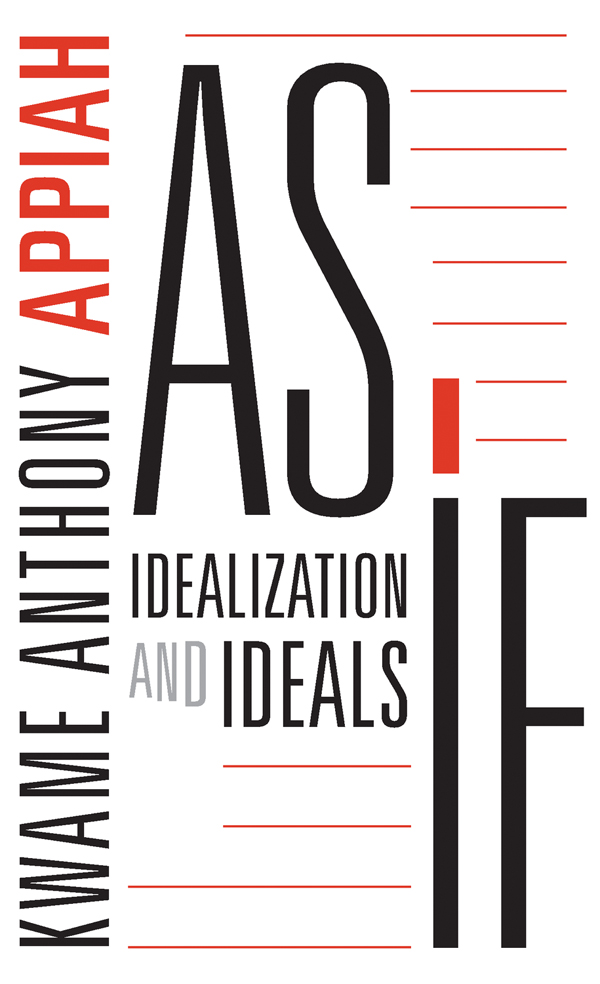
As If
Idealization and Ideals
Kwame Anthony Appiah


Cambridge, Massachusetts
London, England
2017
Copyright 2017 by the President and Fellows of Harvard College
All rights reserved
Jacket design: Jill Breitbarth
978-0-674-97500-2 (alk. paper)
978-0-674-98219-2 (EPUB)
978-0-674-98218-5 (MOBI)
978-0-674-98217-8 (PDF)
The Library of Congress has cataloged the printed edition as follows:
Names: Appiah, Anthony, author.
Title: As if : idealization and ideals / Kwame Anthony Appiah.
Description: Cambridge, Massachusetts : Harvard University Press, 2017. | Includes bibliographical references and index.
Identifiers: LCCN 2017006995
Subjects: LCSH: Idealism. | Pluralism.
Classification: LCC B823 .A83 2017 | DDC 141dc23
LC record available at https://lccn.loc.gov/2017006995
for my students, idealizers and idealists
- Useful Untruths:
Lessons from Hans Vaihinger - A Measure of Belief:
Lessons from Frank Ramsey - Political Ideals:
Lessons from John Rawls
Truth is the shattered mirror strown
In myriad bits; while each believes his little bit the whole to own.
SIR RICHARD BURTON,
The Kasdah of Hj Abd El-Yezd
This book grew out of a series of lectures whose central claim was that, as the German philosopher Hans Vaihinger argued about a century ago, questions about idealization are of central importance in all the major areas of philosophy. The lectures were meant to stimulate more people to consider these questions over a wider rangea wider range, in fact, than any one person could responsibly cover. But often in philosophy it is useful to stand back and take a broad view of a topic, knowing that real progress requires work with a narrower focus as well. I offer this book in that spirit, hoping that it will prove useful in encouraging further explorations of idealization in aesthetics, ethics, and metaphysics, as well as in the philosophy of mind, of language, of religion, and of the social and natural sciences. And that further work, I want to persuade you, will profit from seeing the connections among these many fields.
My aim, then, is not so much to announce any startling discoveries as to persuade you that idealization matters in all the major areas of the humanities and the sciences and in everyday life, and to commend it as a topic of reflection and research. But there is a general lesson that I do want to underline at the start: Once we come to see that many of our best theories are idealizations, we will also see why our best chance of understanding the world must be to have a plurality of ways of thinking about it. This book is about why we need a multitude of pictures of the world. It is a gentle jeremiad against theoretical monism. There will, I hope, be other lessons along the way. But I am going to begin with Hans Vaihingers neglected work, because he made the question of idealization central to his philosophy.
In , then, I introduce some of Vaihingers ideas. Well see how they might work out in the case of some familiar idealizations we make in thinking about human thought and behavior. At least since Aristotle, philosophers have tried to give accounts of why people do what they do by exploring the thoughtsthe beliefs, desires, and the likethat would make their actions rational. But, also from way back, weve known that their actions werent rational, or at least not fully so. The natural thing to say here is that were idealizing. What does that mean?
In , I will be considering the role of what John Rawls called ideal and non-ideal theory in thinking about political philosophy, trying to distinguish various objections to the way he conceived of the task of political philosophy. There I shall argue that in moral and political philosophy, there is a role for a great variety of different idealizing assumptions about the same subject matter.
To say that it is good often to proceed by way of idealization is to argue that sometimes, in thinking about the world, truth isnt what you need. For, as Vaihinger argued, an idealization is a useful untruth. Insisting upon this point runs against a disciplinary habit of mind. Philosophers have a soft spot for truths. Indeed, it is an affection I share. And yet hardly anything we ordinarily say is clearly true.
Take just the last three sentences, by way of example. The first is what linguists call a generic, like Tigers eat people. There are notorious difficulties with generics. Who are the relevant philosophers? How many of them must have this soft spot? What exactly makes sentences of the form X has a soft spot for Y true, anyway? The second sentence inherits all these difficulties: What affection is articulated in the first sentence? As for the third sentence, what makes it true that hardly any Xs are Ys? How many or what proportion of the things philosophers say must fail to be clearly true? What, for that matter, is it to beor not to beclearly true?
You will no doubt have your own answers to these questions. Still, we can agree that each of those sentences is in some way factually defectivemerely truthy, in a recent satiric idiom, rather than truebut not much the worse for that. And trying to say something interesting on almost any topic that isnt open to similar objections will show you how hard it is to get away from this sort of routine defection from the truth.
There are many other reasons for doubting that truth is always the point of assertion. Among the most obvious of them is the pervasiveness of figurative language, which (to use a figure) shows its un-truthfulness on its face. When, to cite a familiar example, Romeo announces that Juliet is the sun, and that yonder window is the east, what he is saying is so obviously untrue that we must interpret his utterance as aimed at communicating a thought that it does not literally express. When Wordsworth speaks of the daffodils in his beloved Lake District as
Continuous as the stars that shine
And twinkle on the milky way
we grasp that we are not meant to believe (or even to believe that the poet believes) that those thousands of flowers flow on across the shores of Grasmere on precisely the same scale as the billions of stars, visible and invisible, in our galaxy. As with Shakespeares metaphor and Wordsworths hyperbole, so too with synecdoche, litotes, and a score of other figures: what matters to us is not the truth asserted but some idea or feeling suggested or implied. (Often, naturally, it does matter whether some implicated thought is true.) These figures are literary; and much of literaturethough, notice, not Daffodilsconsists of fictions, which are not even offered up as true.
In these pages I aim, as I say, to explore some truth-related inadequacies that are different from thesenot literary fiction, not figurative languagebut, I hope, at least as interesting. At the end Ill return briefly to the question why so many of the things we say, in philosophy and the humanities and the sciences as in ordinary life, are instructive, even though not true. I shall argue that it isnt because truth is unimportant. In fact, I shall try to persuade you that if we didnt understand truth, we wouldnt be able to understand these half-truths either.
Font size:
Interval:
Bookmark:
Similar books «As If: Idealization and Ideals»
Look at similar books to As If: Idealization and Ideals. We have selected literature similar in name and meaning in the hope of providing readers with more options to find new, interesting, not yet read works.
Discussion, reviews of the book As If: Idealization and Ideals and just readers' own opinions. Leave your comments, write what you think about the work, its meaning or the main characters. Specify what exactly you liked and what you didn't like, and why you think so.

